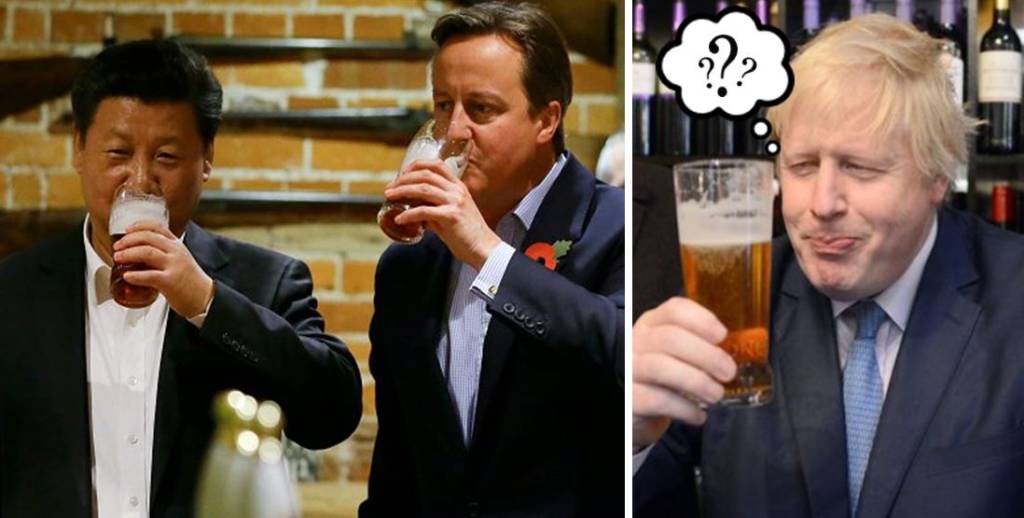Things have come full circle for China in the United Kingdom. Recently, the Boris Johnson government decided to ban its mobile providers from using the Chinese telecom giant’s 5G equipment with effect from December 31. Beijing, of course, replied with threats as the Chinese Communist Party (CCP) mouthpiece Global Times spoke of ‘public and painful’ retaliation against the UK.
For China, the UK expelling Huawei is no less than kicking Beijing out of the picture. China has been fighting a major battle with US President Donald Trump over Huawei. And the fact that the UK, which had for long been reluctant to go against China, has now finally taken Washington’s lead is going to hurt China a little bit more.
Things have escalated quickly for Xi Jinping in the UK. For China, it is now hard to believe that less than five years ago, Xi Jinping was sharing a beer pint with former UK Prime Minister David Cameron at a pub in the English county of Buckinghamshire. It is a different matter that China bought the same pub a year later. The UK has slipped out of China’s hands dramatically.
UK-China relations were in deep freeze even in 2012, after then UK Prime Minister David Cameron met the Dalai Lama in London. A red-faced Beijing had cancelled all meetings with the UK, and bilateral relations had hit an all-time low. But then David Cameron went out of his way to forge warm ties with China.
David Cameron’s 2013 visit had bolstered UK-China ties in what Beijing would have considered a major diplomatic win. On his three-day visit to China, Cameron meant business. The largest British trade delegation ever consisting of more than 120 people had accompanied the former UK Prime Minister and agreements worth 6 billion pounds were signed between the two countries.
The UK was still a part of the European Union in the Cameron era, and Xi Jinping saw this as an opportunity to wean the intergovernmental organisation away from Washington. Bilateral visits had become frequent. In 2014, Chinese premier Li Keqiang visited the UK.
A year later, George Osborne, then the Finance Minister of Britain declared in Shanghai, “We need China to power our economy forward.”
The Sino-British partnership however reached its zenith with Jinping’s 2015 visit to the UK. It was during this visit that the two leaders ended up at a pub. Cameron had promised a “golden era” in bilateral ties ahead of the Chinese President’s visit.
Xi Jinping himself lauded the UK for its ‘visionary’ openness and China exhorted others to go down the same path.
Things, however, went south for China as soon as Cameron was ousted from power. When Theresa May came at the helm of affairs, the level of enthusiasm between London and Beijing went down considerably. Many ambitious projects like an RMB bond issuance and a London-Shanghai stock got sidelined.
Things went from bad to worse with Boris Johnson storming to power. Two major geopolitical events have spoiled Sino-British relations. First, Brexit finally happened this meant that the UK went closer to Washington. And secondly, Trump started pushing allies to reject China starting with Chinese 5G major, Huawei. Trump envisaged a bipolar world with China at the other end, and left no choice for USA’s friends but to choose between the two.
London no longer has the choice of keeping warm ties with both China and the US. Bipolarity between China and the US meant Johnson had to make a choice and Johnson chose Trump. Huawei, which had tremendous potential in the British market, became the biggest casualty of this repositioning in the UK strategy.
Throughout 2018, Huawei had made deep inroads into UK’s next-gen wireless network. Huawei signed deals with all telecom operators in the UK, except O2. Huawei and BT Group signed an agreement in February 2018 to extend their strategic partnership and focus on the 5G equipment.
BT’s EE is believed to be using Huawei at two-thirds of mobile sites. Another British telecom provider, Three had announced in August 2018 that Huawei would be its sole supplier of 5G RAN technology.
Vodafone too had announced a strategic partnership on 5G technologies in February 2016 itself. Consequently, 32 per cent of Vodafone’s mobile sites are reportedly using Huawei equipment.
China was under the illusion that it has won the Huawei battle against Trump in the UK. It was only after Trump started pressurising Boris that things changed. In January this year, the UK limited Huawei to 35 per cent market share.
Huawei fought till its last breath but American pressure prevailed. Even when the UK was preparing to ban it, Huawei urged the UK not to remove it. Moreover, the global backlash due to the Coronavirus Pandemic and Chinese belligerence in the Indo-Pacific Region meant that Boris had to take a call on Huawei.
China saw Huawei slip out of UK in front of its eyes. An intelligence report indicated that Huawei is relying on “untrusted” equipment due to US sanctions. This was the tipping point for Boris and soon Huawei got banned in the UK.
The UK relied on an intelligence report to kick out Huawei and this could set in a domino effect, with other European countries finding another major reason to follow suit. France and Germany could be the next big losses for China.
With Huawei getting banned in the UK, Beijing knows it has lost a big battle against Trump. UK is no US, Australia or Japan. It was becoming an ally not too long ago, but China has lost it. The USA is by now, a sworn enemy but getting wrapped by London too is something that is going to hurt Beijing a little bit more.
